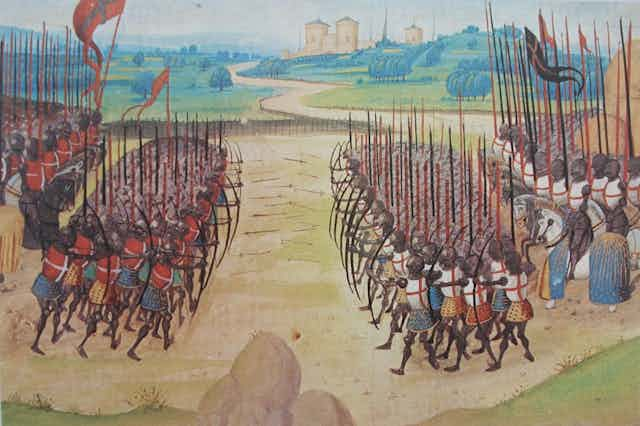Henry V’s 1415 victory against the French at Agincourt is a key point of pride in British memory, and as such celebrations for this week’s 600th anniversary are multiple and varied. Options include the Tower of London’s exhibition, featuring medieval arms and armour, experiencing “the sights and sounds of twenty thousand arrows darkening the battlefield skies” at Leeds Castle or attending one of the many commemoration services in churches around the country.
What Shakespeare might have thought of all this commotion is interesting to consider, as it’s largely down to him that Agincourt haunts British memory. His plays have kept “this glorious and well-foughten field” alive, championing its power as a myth of national unity and heroism. “King Henry the Fifth, too famous to live long” is given an afterlife which raises him to the status of a superhero in Henry VI Part I:
His arms spread wider than a dragon’s wings;
His sparking eyes, replete with wrathful fire.
The statistical significance of the victory at Agincourt by “we few, we happy few” is advertised in Shakespeare’s listing of French and English casualties in Henry V: 10,000 “slaughtered French” including 126 nobility, 8,400 knights, esquires and gentlemen and 1,600 mercenaries, contrast with just 29 English dead, whose names Henry reads: the Duke of York, the Earl of Suffolk, “Sir Richard Keighley, Davy Gam esquire / None else of name”, and 25 commoners.
Rousing rhetoric
Henry V overflows with rousing patriotic speeches and these speeches have lent themselves remarkably well to versions of British patriotism over the years. Shakespeare’s dramatisation of the battle champions rhetoric, Henry inspiring his troops with dreams of glory. The fact that they are outnumbered by the French just means a greater share of honour for those present.
Henry V promises that fighting at Agincourt will eliminate class boundaries: “He today that sheds his blood with me / Shall be my brother” and that his soldiers’ names will “be in their flowing cups freshly remembered” by future generations.
The “wonderful” victory at the Battle of Agincourt has been especially invoked at times of national or political crisis to awake feelings of patriotism. The play was staged just at the point when the Earl of Essex was miserably failing to establish imperial control over the Irish, and, some thought, to lead a coup for Queen Elizabeth’s throne. Agincourt reminded spectators of the English victory over the Spanish Armada at a time when national stability and succession was precarious.
More recently, in Laurence Olivier’s 1944 film, and Kenneth Branagh’s 1989 post-Falklands film, Henry’s speech celebrating the “band of brothers” and “we few, we happy few” engaged with the patriotic political agendas of Winston Churchill in World War II and of Margaret Thatcher’s attempt to retain power. Indeed, Branagh’s delivery of the speech from a raised cart amongst his troops deliberately echoes Olivier’s which is shot from the same angle.
Not so glamorous
So the seductive image of a “band of brothers” fighting against a common enemy is well remembered. But the play’s equally sound critique of Henry’s campaign has often been ignored.
Shakespeare does not depict the Battle of Agincourt as simply “glorious”. The play repeatedly punctures its own representations of national unity and glory. The four Captains of England, Scotland, Wales and Ireland are not as united as they first appear and doubts are raised about the number of Irish fighting for Henry. Before the army even leaves English shores, treason is uncovered amongst three noblemen, “English monsters” who have plotted to kill King Henry for French gold.
Although the Chorus proclaims that “all the youth of England are on fire”, the cast includes characters who do not want to be there or are fired by the desire of looting, “to suck, to suck the very blood to suck” as Pistol says. His boy servant is disgusted by English cowardice and petty theft.
The play insists on the brutality of war, in spite of Henry’s insistence that the French people, including the women, are not to be harmed. Burgundy’s plea for “naked, poor and mangled peace” hints at the damage done and tellingly observes that the French people “grow like savages, as soldiers will / That nothing do but meditate on blood”. Henry’s wooing of the French princess Katherine romanticises his conquest, but this scene can be played as a rape to heighten the cruelty of his imperialist power.
Most unsettling is the common soldier Williams who, in the wretched, mud-drenched English camp, challenges the disguised king by refusing to trust that his cause is “just and his quarrel honourable”. Henry rewards Williams after the battle with crowns, but Williams cannot be bought off so easily. The most powerful moment of the current RSC production is when Williams punches Henry, “the mirror of all Christian kings” in the face, enraged by his deception.
Shakespeare’s celebration of Agincourt is thus also a critique of the process of memorialisation, which creates elite superheroes but conveniently forgets sceptics like Williams in its list of casualties with “none else of name”. On this 600th anniversary, we would do well to remember these less savoury elements of the play – and the battle.

